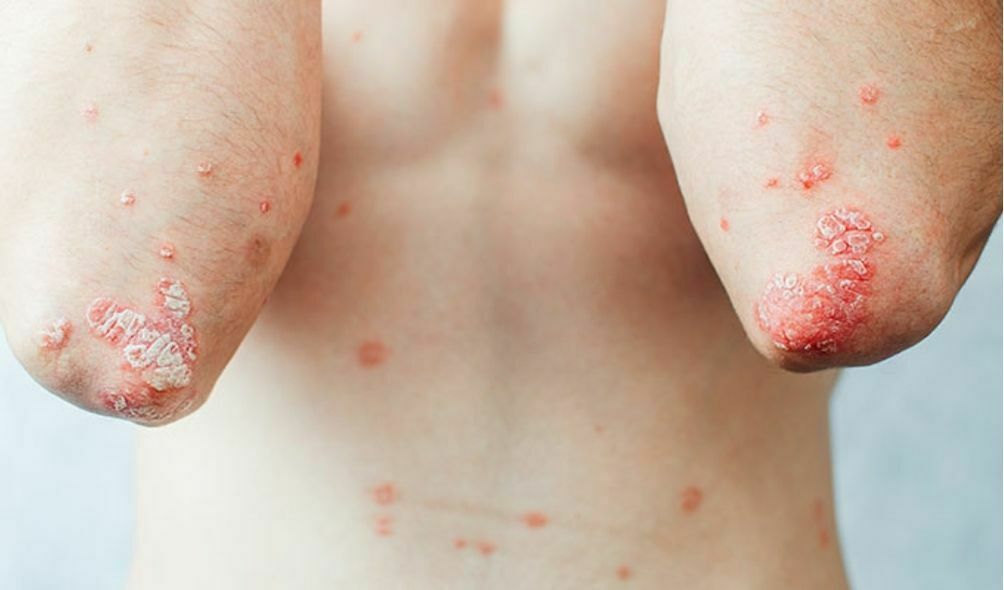Psoriasis is an autoimmune disease which impacts the skin and is characterized by marks and patches on the skin. Psoriasis is a disease when the skin cells multiply many times over the normal rate and cause a buildup of skin cells on the skin making the surface of the skin look like scales with red patches. The skin cells can multiply up to 10 times the normal rate in Psoriasiss and the red patches that appear on the skin can crack up and bleed. Psoriasis is a chronic problem of the skin. These skin cells slowly grow and reach the surface of the skin and then eventually fall off. The life cycle process of the psoriasis skin cells is generally one month.
Five types of Psoriasis affect human skin and cause irritation and medical issues for people all over the world. The types of psoriasis conditions include plaque psoriasis, guttate, inverse, pustular, and erythrodermic psoriasis. However, plaque psoriasis is the most common type of psoriasis condition as it makes up a large number of the cases. Psoriasis can develop anywhere on the skin but predominantly appear on the hands, feet, neck, scalp, and face areas of the skin.
The Symptoms and Signs of Psoriasis
This is a skin problem and the symptoms and signs of this disease are very apparent and easy to diagnose for most medical professionals. Psoriasis appears on the skin and causes red patches and scales on the skin which is the most visible sign of the disease. Whitish and silvery scales appear on the skin and plaques appear on the psoriasis red patches and the skin becomes dry and cracked in the long run. These red patches tend to cause soreness and can bleed as they get cracks in them. Psoriasis causes skin inflammation and the red patches caused by psoriasis are usually itchy and can even have an uncomfortable burning sensation.
There are many other symptoms and signs of Psoriasis which can be painful and uncomfortable. This includes thick and pitted nails and also painful and swollen joints which can be a symptom of this disease. Psoriasis is associated with other diseases and problems and is connected to type 2 diabetes, inflammatory bowel disease, psoriatic arthritis, heart disease, anxiety, and depression.
Causes of Psoriasis
- Immune System
The basic issue of Psoriasis is that it is an auto immune disease which means it is directly linked to the immune system in the body. The body in an auto immune problem basically attacks itself from the inside. It accelerates the production of skin cells in the body and the body goes into overdrive producing these types of cells. These skin cells push up to the surface of the skin and become red, itchy, inflamed, and painful before they fall, usually in a month.
- Psoriasis – Hereditary Disorder
Psoriasis can be a hereditary disorder which means that it can be passed on genetically within the family. People can inherit this disease from their parents but the rate at which psoriasis passes genetically is low. This means that there is a low chance of children inheriting the disease even if their parents have had this skin condition.
Causes of Psoriasis Flare Ups
Psoriasis is a chronic issue which means people suffer from it over a long time and there are periods of time when the problem of psoriasis is slow and when there are many flare ups which may be caused by a range of different conditions. This includes environmental factors like cold and dry weather and also stressful situations can cause flare ups. Some types of medicines can cause psoriasis flare ups and infections like respiratory infections can cause psoriasis to flare up. An injury to the skin, smoking, and alcohol are also causes for the psoriasis disease to flare up over the long run.
Psoriasis – A Chronic Disease
Psoriasis is a chronic disease which means that people with psoriasiss can either get mild to severe flare ups time and time again throughout their lives. This is a chronic condition which people have to manage and live with for a long time. They have to take care of their diet and also exercise effectively to manage this disease. There are some foods that are good for keeping psoriasiss at bay while other foods are considered as triggers which can cause psoriasis flare ups. Dairy, nightshade fruits and vegetables, red meat, refined sugar, and processed food can all trigger psoriasis and must be avoided in the diet. Omega 3 fatty acids, vitamins, wholes grains, and plant based foods are good for managing this disease on the skin.
This is a chronic disease and yoga and meditations not to mention proper exercise will help with the management of this disease. Taking vitamin supplements, avoiding alcohol and cigarettes, losing weight, and battling obesity are all ways to keep psoriasiss at bay. This is a very visible disease on the skin which can cause many mental issues for the patient. There is stress caused by this disease and many people have low self esteem issues caused by this disease. Psoriasis patients are susceptible to depression, stress, and anxiety and it is important to deal with the mental health issues caused by this problem. The physical and mental health of the patient needs to be taken care of to manage this disease effectively.
Getting Rid of Psoriasis
- Treatments
There are many ways to get rid of or manage the problem of psoriasiss so that the patients suffering from skin disease can lead relatively normal lives. Getting rid of psoriasiss depends on the severity of the problem and the type of treatment prescribed by the doctors treating this disease. The causes and symptoms of the disease also play a role in deciding on the treatment of the disease. There are usually three types of treatments available for different types of skin problems associated with psoriasiss. These include topical treatments, medication, and in some cases light therapy.
The topical treatments to treat psoriasiss include skin creams, moisturizers, salicylic acid, and medical creams which can reduce the inflammation and psoriasiss on the skin. There are many types of injected and oral medications available in the market for psoriasiss. Phototherapy or light therapy is another method to solve this disease as sunlight gets rid of overactive white blood cells which cause accelerated skin cell growth which causes psoriasiss.
Psoriasi s is a skin problem faced by many people all over the world and there are various types of skin diseases and various ways to get rid of and manage this skin problem over the long run. It is a chronic disease which means there are periodic flare ups of this disease that can occur on different areas of the skin which can be painful, embarrassing and irritating for the patients suffering from this disease. A healthy lifestyle and access to proper treatment and medical help will help people effectively manage this disease. There are many other diseases linked to psoriasiss, most common among them is psoriatic arthritis.
This is a visible, long term and irritating disease and the severity of the disease can vary from person to person. It is a disease that has treatments and managing this disease by accepting it as a part of life is a healthy way to treat the disease.








